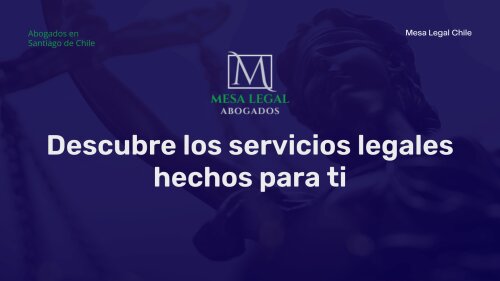Best Adoption Lawyers in Chile
Share your needs with us, get contacted by law firms.
Free. Takes 2 min.
Free Guide to Hiring a Family Lawyer
Or refine your search by selecting a city:
List of the best lawyers in Chile
About Adoption Law in Chile
Adoption in Chile is a legal process governed by a specific set of laws aimed at protecting the welfare of children while ensuring the rights of biological parents and adoptive parents are respected. The main legislative framework is provided by the Civil Code and the Minors Act, with specific provisions managed by the Servicio Nacional de Menores (SENAME). Adoptions can be either open or closed, with particular regulations detailing the rights and responsibilities of all parties involved. The process is designed to ensure that the best interests of the child are paramount, prioritizing stable and nurturing family environments.
Why You May Need a Lawyer
While the adoption process in Chile is structured, it can be complex. A lawyer can provide guidance in situations such as:
- Navigating the legal system: Ensuring compliance with all procedural requirements and regulations.
- Understanding eligibility criteria: Advising prospective adoptive parents on requirements and qualifications needed to adopt.
- Handling disputes: Resolving potential conflicts between biological and prospective adoptive parents.
- Documentation: Assisting with the preparation and submission of necessary legal documents.
- International adoption: Managing additional complexities involved in adopting internationally.
Local Laws Overview
Key aspects of adoption laws in Chile include:
- Eligibility: Both Chilean nationals and foreign residents can adopt, subject to meeting specific criteria, such as age and marital status. Generally, adoptive parents must be at least 25 years old and at least 20 years older than the child.
- Types of Adoption: Chile allows both domestic and international adoptions, with specific provisions for each to ensure the child's safety and welfare.
- Role of SENAME: The Servicio Nacional de Menores oversees the adoption process, ensuring that all adoptions follow the legal framework and prioritize the child's best interests.
- Consent: The biological parents or legal guardians of the child must provide consent unless specific legal exceptions are met.
- Procedure: The adoption process involves various stages, including application, evaluation, and legal proceedings, all conducted under the supervision of family courts.
Frequently Asked Questions
What are the basic requirements for adopting a child in Chile?
Potential adoptive parents must meet criteria such as being over the age of 25, being at least 20 years older than the child, and demonstrating financial and emotional stability.
How long does the adoption process typically take?
The duration can vary, but it generally takes between six months to several years, depending on the specific circumstances and whether it is a local or international adoption.
Is it possible for single individuals to adopt in Chile?
Yes, single individuals can adopt, provided they meet all legal requirements and are deemed suitable by the authorities.
Can adoptive parents maintain contact with the child's biological family?
In open adoptions, ongoing contact may be facilitated, depending on the agreement set during the adoption process.
What is the role of the family court in the adoption process?
Family courts are responsible for ruling on the suitability of adoptive parents and the overall legality of the adoption process, ensuring the child's best interests are upheld.
Are international adoptions allowed in Chile?
Yes, international adoptions are permitted. However, they involve more complex regulations, including compliance with both Chilean and international laws.
What documents are needed for adopting a child?
Common documents include personal identification, proof of financial stability, medical examinations, background checks, and home study reports.
How is the post-adoption process handled in Chile?
Adoptive families may undergo post-adoption assessments to ensure the child's integration and welfare within the new family environment.
Can adoption decisions be appealed?
Yes, decisions made regarding an adoption case can be appealed in accordance with legal procedures if there are grounds to challenge the ruling.
How are children selected for adoption?
The selection process seeks to match children's needs with suitable families, considering the potential adoptive parents' abilities to provide a supportive environment.
Additional Resources
Consider reaching out to these resources for further guidance:
- Servicio Nacional de Menores (SENAME): The governmental body overseeing adoption processes in Chile.
- Chilean family courts: Legal institutions handling adoption approvals and disputes.
- Adoption agencies: Various local and international agencies can assist with the adoption process.
- Legal consultation services: Law firms specializing in family law and adoption.
Next Steps
If you are considering adoption in Chile and need legal assistance, consider the following steps:
- Research thoroughly to understand your eligibility and any specific requirements applicable to your situation.
- Consult a family law attorney who specializes in adoption to help navigate the legal complexities involved.
- Contact SENAME or a reputable adoption agency for guidance and assistance with the process.
- Prepare all necessary documents and complete required procedures in line with legal requirements.
- Attend any necessary court proceedings with the support of your legal advisor to finalize the adoption.
Lawzana helps you find the best lawyers and law firms in Chile through a curated and pre-screened list of qualified legal professionals. Our platform offers rankings and detailed profiles of attorneys and law firms, allowing you to compare based on practice areas, including Adoption, experience, and client feedback.
Each profile includes a description of the firm's areas of practice, client reviews, team members and partners, year of establishment, spoken languages, office locations, contact information, social media presence, and any published articles or resources. Most firms on our platform speak English and are experienced in both local and international legal matters.
Get a quote from top-rated law firms in Chile — quickly, securely, and without unnecessary hassle.
Disclaimer:
The information provided on this page is for general informational purposes only and does not constitute legal advice. While we strive to ensure the accuracy and relevance of the content, legal information may change over time, and interpretations of the law can vary. You should always consult with a qualified legal professional for advice specific to your situation.
We disclaim all liability for actions taken or not taken based on the content of this page. If you believe any information is incorrect or outdated, please contact us, and we will review and update it where appropriate.
Browse adoption law firms by city in Chile
Refine your search by selecting a city.
















